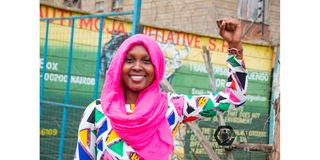Period poverty exposing teen girls to sexual abuse

Yasmin Nassur, a feminist, menstrual advocate and founding director of Superb, a community-based organisation.
What you need to know:
- The government's sanitary towels programme has, however, been hit with integrity questions.
- The Auditor General queried the payment of Sh104 million for the purchase of sanitary towels for public schools in the 2019/20 fiscal year.
- The Basic Education (Amendment) Act requires the government to provide free, sufficient and quality sanitary towels to every girl in public school.
Three years ago, I interviewed Yasmin Nassur about her work in promoting menstrual dignity among vulnerable girls in Kibra, an informal settlement in Nairobi County.
That was in May 2020, at the peak of Covid-19 when households were financially on their knees following closed or slow businesses and lost jobs.
At the time, she was directly supporting 70 girls with pads, including the school-going, thanks to a donation from Amref Health Africa.
Ms Nassur said then that Covid-19 predisposed girls to sexual exploitation to meet their needs, including pads. Two years later, I speak with her to find out any progress made in enabling the vulnerable girls to access the sanitary towels.
“The price of pads has shot up, making them inaccessible to girls and women in the informal settlements and poor households,” she says.
In 2020, a pack of seven to 10 pads in the major supermarkets went for an average price of Sh50. In 2022, the cost had hit Sh80. Now, they are retailing at Sh85.
Ms Nassur notes: “We get a lot of requests from girls in public school which means that they are not getting enough from the school yet there is a law that mandates the government to supply them with the pads.”
Legal foundation
Section 39(k) of the Basic Education (Amendment) Act (2017) requires the government to “provide free, sufficient and quality sanitary towels to every girl child registered and enrolled in a public basic education institution who has reached puberty and provide a safe and environmentally sound mechanism for disposal of the sanitary towels.”
The sanitary towels programme has, however, been hit with integrity questions. Auditor General Nancy Gathungu queried the State Department’s payment of Sh104 million for the purchase of sanitary towels for public schools in the 2019/20 fiscal year.
Ms Gathungu noted irregularities, saying no document was provided to support payment, which was for pending bills brought forward from the previous fiscal period.
Meanwhile, in 2022, Ms Nassur launched an online petition pushing for increased budgetary allocation for the programme. She has so far collected more than 5,000 signatures. She hopes to reach at least one million for it “to attract the attention of the government and legislators”.
Over the years, the government has shrunk the programme’s budget. In the 2012/13 financial year, Sh300 million was set aside. The amount was reduced to Sh30 million in 2013/14 financial year. In the 2017/18 financial year, the programme was allocated Sh470 million. In the following financial year, the budget was further reduced to Sh260 million.
In less than a year, the country has witnessed interesting events exposing legislators' lackluster attitude towards menstrual dignity.
In October last year when the National Assembly Committee on Appointment rejected the nomination of Peninah Malonza for being incapable to manage Tourism, Wildlife, and Heritage docket, South Mugirango Member of Parliament, defended her. But his ground for her support was weird. Mr Silvanos Osoro claimed she may have failed her interview because she was on her menses, yet no studies have proved that women’s cognitive capability is diminished when they are menstruating.
Last February, nominated Senator Gloria Orwoba was ejected from the chambers for having soiled her suit. And it was her fellow woman nominated Senator Tabitha Mutinda who first alerted the house to her situation and even criticised her.
In a subsequent interview with Nation.Africa, Ms Orwoba indicated that she had drafted a sanitary towels provision bill. She did not, however, respond to the query on the progress she has made so far with the proposed legislation.
For Ms Nassur, lack of government’s commitment to addressing period poverty spells doom for vulnerable girls. She said many are left with no choice but to engage in transactional sex to afford necessities, pads included.
“It's really unfortunate that our government has not prioritised addressing period poverty. So many girls in the informal settlements or rural areas cannot afford pads. This is an urgent issue that needs immediate attention,” she said.





